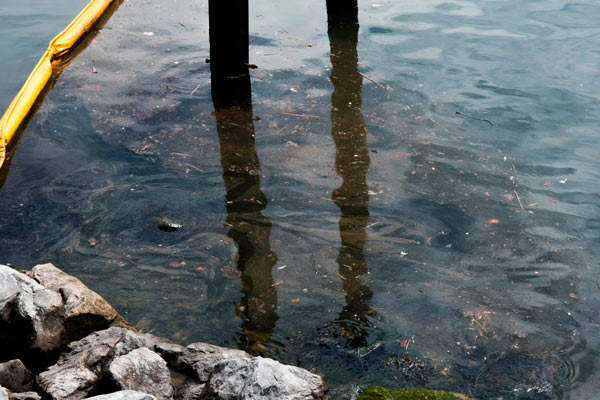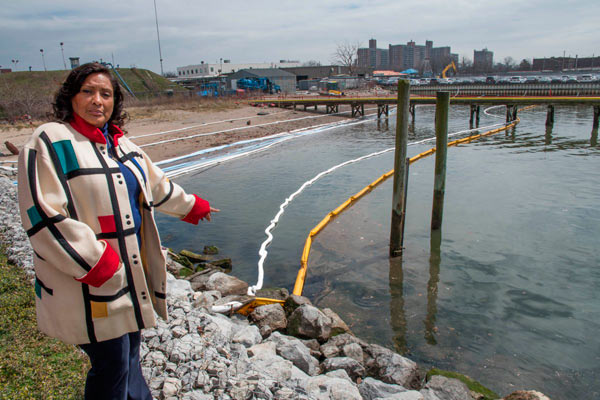A Gravesend oil distributor spilled 27,000 gallons of fuel into Gravesend Bay overnight on March 30.
Bayside Fuel Oil Depot Corporation on Shore Parkway near Bay 38th Street accidentally dumped enough oil to fill five 15-foot round swimming-pools at around 2:45 am when a worker transferring oil to two 150,000-gallon tanks from a barge left his post and the containers overflowed, according to a report by the federal Environmental Protection Agency.
The fuel initially pooled on the soil and gradually seeped down into the bay, and officials say they observed an oil sheen migrating deeper into the bay even after a floating barrier — known as a boom — was deployed to curb the slick.
A company spokesman said the spill was an avoidable act of incompetence, but claimed workers did what they could to stop the bleeding as quickly as possible.
“It was human error. We learn from every experience we go through, but we immediately reported it to the state Department of Environmental Conservation, the Fire Department, every agency we could think of,” said Robert Seledan. “We didn’t wait days — we notified them in a matter of a couple of hours even though the spill happened in the middle of the night.”
The Department of Environmental Conservation is overseeing the cleanup and has contracted Miller Environmental Group to clear the toxic sludge.
Workers have covered the tanks that overflowed and the sloping soil where oil leaked into the bay with poly sheeting to minimize the risk of more oil flooding the bay from forecasted heavy rains, according to Environmental Protection Agency records.
Miller Environmental plans to deploy additional booms along the shore and is power washing the asphalt around the beach. But clean-up efforts are only one of several steps that must be taken by the state to keep the public safe and informed, said a local pol.
“I specifically want to call out the state Department of Environmental Conservation for failing to contact officials and telling us what’s going on,” said Councilman Mark Treyger (D–Coney Island) who was initially e-mailed reports of the spill by environmental advocates. “This seems to be a disturbing pattern that I find out about disasters in our waterways through advocates instead of environmental agencies. It’s unacceptable and unbecoming of agencies that are monitoring our waterways and should be keeping the community notified.”
The spill comes on the heels of the discovery of asbestos at the construction site of a waste transfer station two blocks from Bayside Fuel, which pols contend is the result of the city improperly clearing away an illegal garbage incinerator, and of a Gravesend apartment complex dumping 200,000 gallons of raw sewage per day into Coney Island Creek — possibly for years — that was made public last November after environmental watchdogs leaked e-mails to this paper.
Livid locals slammed the city and state for not immediately notifying elected officials and the community — who regularly fish, swim, and even hold baptisms in the fetid waters — but now it feels those calls for greater transparency have fallen on deaf ears, said one environmental advocate.
“Stakeholders and elected officials shouldn’t be finding out about this through a chain five days later,” said Charles Denson, who initially heard of the spill through a state insider. “When you have [the Environmental Protection Agency] doing an emergency response, there should be more of a notification. They don’t seem to think it’s a big deal — but we do.”
Other locals said they are fed up with the lack of respect to their home and health.
“What a mess. You know this just makes me so angry because people keep causing these horrific accidents that are destroying everything that we’re trying to do,” said environmental activist Pamela Pettyjohn, who was at the bay the day before the spill scouting spots to place oyster beds. “It’s just scary that all these things keep happening — all this illicit dumping — and the public is just an afterthought.”


























